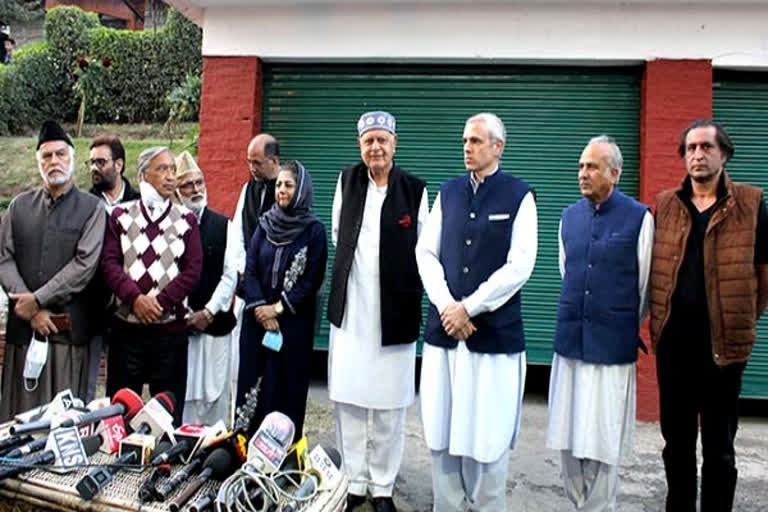Hyderabad: The meeting between Prime Minister Narendra Modi and Jammu and Kashmir politicians will finally take place on 24th June and the invitation for the same has gone from the Home Ministry. This probably signals the beginning of electoral politics in the region after the erstwhile state was stripped of its special status by abrogating Article 370 in August 2019.
An amalgam of major political parties called the People's Alliance for Gupkar Declaration (PAGD), which came into existence against the special status abrogation, had declared the restoration of the pre-370 abrogation status as its goal. But what appears to be the likely outcome of the scheduled meeting is that the invitees, who have differing demands, will settle for some form of an electoral process.
Nearly all major and minor political groups, including National Conference, People's Conference, People Democratic Party, CPI(M) and Apni Party have been invited by the Centre for talks. Sajad Lone, earlier a part of PAGD, will now represent his party - PC - while Altaf Bukhari who represents Apni Party and was a minister in the PDP-BJP alliance, is seen in the local political circles as a proxy of the BJP.
Before the government formally started the talks process, the backchannel diplomacy was going on for some time between mediators fielded by the government and regional leadership of Jammu and Kashmir. Some changes have taken place on the ground in between, such as the release of a few politicians who can play a role in persuading those who have apparently taken a hard stand on the abrogation of autonomy.
Also read: PDP authorises Mehbooba Mufti to take final call on attending all-party meet
Sartaj Madni, the uncle of Mehbooba Mufti, is one such politician who has a big say in her decision-making. He was part of major decisions even when Mufti Muhammad Sayeed, her father and former chief minister, was alive.
Another influencer could be Sajad Lone, whose proximity with the BJP leadership is well known, especially during his ministership in Mehbooba's cabinet. Leaders in Delhi are believed to have a strong liking for him, being someone who has been critical of a faction of the Hurriyat Conference. Lone's participation might therefore serve Delhi more than the Gupkar Alliance.
After Omar Abdullah was released from jail he has somehow normalized what he called abnormalcy post abrogation of article 370. He lobbied for the restoration of 4G more than for the restoration of the special status after his release. He is known as someone who spends more time on Twitter than on the political affairs of his party or the ground. He was criticized for nonchalance during the agitation of 2010, when he was the chief minister and dozens of street protesters were killed.
His father, Dr Farooq Andullah, can possibly be a little difficult for New Delhi while negotiating with him on something lesser than what he may be expecting from the talks.
The agenda is not yet decided but restoration of political activities for the formation of normal governance structures in the region is possibly going to be discussed. The process to study the demographics, population and political choices of people has already begun and Deputy Commissioners of the entire Union Territory have already been asked to submit their reports over to the delimitation commission, which will redraw the seats before the elections.
Also read: PDP leader Sartaj Madni released after a six-month-long detention
The commission held a meeting in February this year, which was skipped by all MPs of Kashmir valley including Farooq Abdullah. Unless Delhi was certain of the participation of J&K leadership in the meeting scheduled on 24th June, the Government of India may not have risked inviting them. That is apparently the reason that everyone except Mehbooba showed a willingness to attend the meeting. She has asked for an agenda before attending the meet.
A few developments are expected on the separatist front to provide the 'script of normalcy' an aura of authenticity. Some 'soft' separatist leaders may be released but those perceived as hardliners are likely to remain incarcerated.
Two separatist leaders who could have posed problems to the local mainstream leaders are Ashraf Sehrai, who died during imprisonment, and Masrat Alam, who has been in jail for the better part of his life.
Also, in the past two years, Gupkar Alliance leaders appear to have carved out space in the political landscape overshadowing the separatists. Pakistan's current stance on Kashmir also appears to suit them at this time. A lot of work by a Dubai diplomat went into renewing the border ceasefire between the two countries, which definitely will have a bearing on the developments in Kashmir.
Therefore the whole game is in favour of India and the negotiators from Delhi will have a lot to negotiate on. Kashmiri leadership is on the receiving end. Apparently, they may look united but their own interests and the parties they represent will triumph in the end. Such inherent discord was evident during the District Development Council elections when their differences over seat-sharing came out in the open.
Also read: Received call, no formal invitation yet, says PDP chief over PM's all-party meeting with J-K leaders
This entire process is going to help in the image makeover for India at the international level, particularly after much noise over the Indian parliament's decision on August 5, 2019. The talks and their possible outcome (electoral process) will exhibit normalisation of Kashmir without a special status and will cement India's resolve - Kashmir as India's integral part. It is also going to benefit BJP in the 2022 assembly elections in several states, including Uttar Pradesh.



